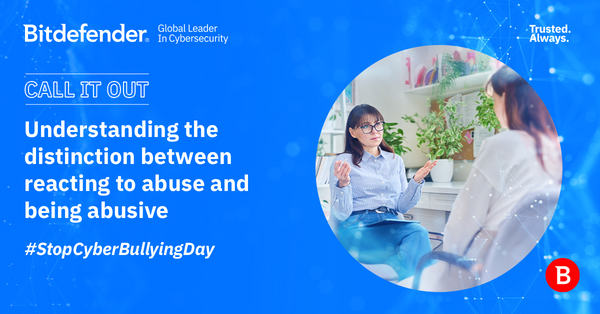Stop Cyberbullying Day: Reacting vs. Responding to Verbal Abuse Online

Online interactions have become an integral part of our daily lives in the digital era. However, this unceasing desire to connect and communicate with others online also brings challenges to people of all ages and backgrounds.
Cyberbullying, including verbal abuse and other harmful behaviors, is one of the dark facets. It can have a deep emotional and physical impact on victims. As such, it has become imperative for digital citizens to understand the difference between reacting and responding to online verbal abuse to handle and overcome these harmful situations effectively.
Verbal abuse online can manifest in many forms, including false information, threatening language, hurtful comments, and harassment. The anonymity of the internet and the distance between cyberbullies and victims makes it much harder to counter.
Reacting to Verbal Abuse
Reacting to online verbal abuse is usually triggered by an immediate emotional response, with victims feeling angered, scared, or hurt.
Here are some examples to give you a more in-depth perspective:
- Emotional Outbursts. Your reaction is fueled by heightened emotions, which cause you to respond with anger and frustration.
Example: You send an angry message.
- Impulsivity. You react without giving much thought to the potential consequences.
Example: You post a public rant or begin making threats.
- Retaliation. You engage in hurtful behaviors similar to the abuser to get “revenge.”
Example: You begin posting insults directed towards the abuser.
These emotionally driven reactions can have a negative impact; here’s why:
- They escalate the conflict, leading to more harassing behavior
- Make you more vulnerable to online harassment by allowing the abuser to exploit your emotional state
- You may stain your online reputation by posting or saying things you will later regret
Responding to Verbal Abuse
Responding to verbal abuse online involves a more calculated or deliberate approach that empowers you and helps you manage the situation effectively. The goal of responding is to de-escalate the harmful cycle of abuse and protect yourself against emotional harm.
Here are some powerful strategies to adopt when responding to verbal abuse online:
1. Remain calm and composed. Control your emotions and interaction by taking a moment to breathe and assess the situation before replying.
2. Set boundaries. Clearly assert that abusive behavior is unacceptable and the actions you will take if it does not end. Example: You will block the abuser.
- Seek support. Always remember you are not alone – you can share your negative experiences with friends and family for advice, assistance or even a fresh perspective on the situation.
- Use reporting tools. Most social platforms allow you to block, report or mute individuals who engage in abusive or harassing behaviors online. Familiarize yourself with these tools and never hesitate to use them to report abusive comments online.
- Adjust your privacy settings. Use privacy settings to limit who can contact you or see your posts or personal information.
- Document the abuse. Should the harassment escalate, keep records of abusive behavior. This could involve taking screenshots of messages and comments to have them as proof and share them with the relevant authorities or platform moderators.
Example of Reacting vs. Responding
Someone harasses you on social media
- Reacting: You immediately begin insulting the individual who posted hurtful comments or insults.
- Responding: You could say, “I don’t appreciate your comments. I’m blocking you and reporting this behavior.”
Knowing how to handle verbal abuse online has a tremendous positive impact on your well-being and minimizes harm.
By shifting the focus on responding rather than reacting, you can maintain moral high ground and self-respect, nurture a positive emotional state, enhance your communication skills and conflict-resolution abilities, and be an example for other digital community members.
Join the #CallItOut movement and learn how to effectively put a stop to verbal abuse online this Stop Cyberbullying Day!
tags
Author
Alina is a history buff passionate about cybersecurity and anything sci-fi, advocating Bitdefender technologies and solutions. She spends most of her time between her two feline friends and traveling.
View all postsRight now Top posts
How Do You Manage Your Passwords? We Ask Netizens
December 18, 2025
Cybercriminals Use Fake Leonardo DiCaprio Film Torrent to Spread Agent Tesla Malware
December 11, 2025
FOLLOW US ON SOCIAL MEDIA
You might also like
Bookmarks








